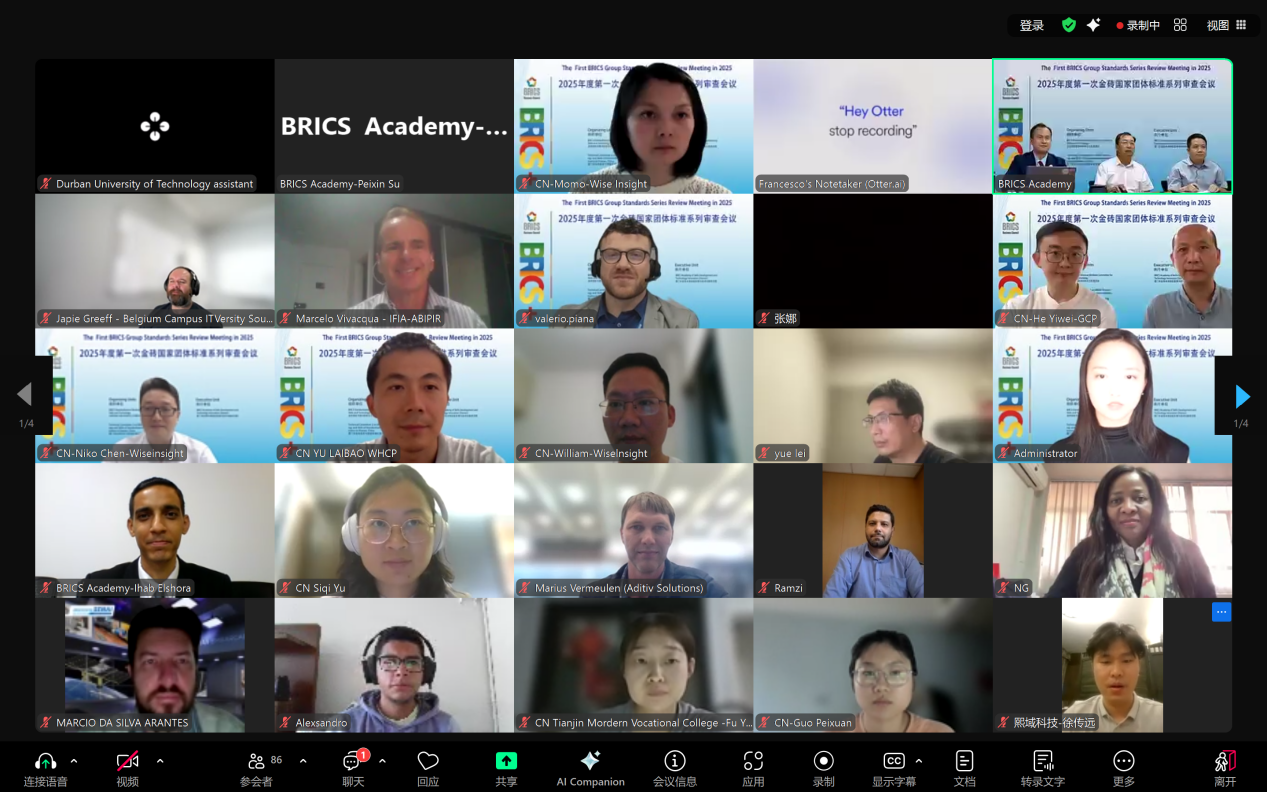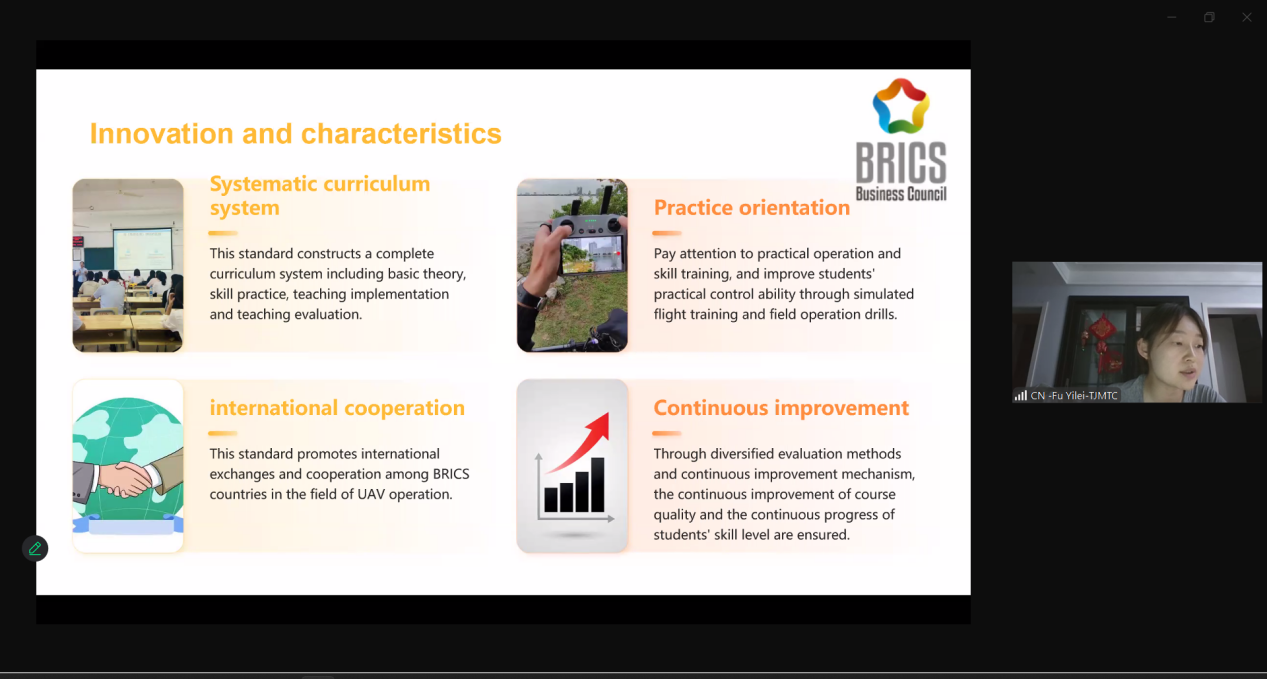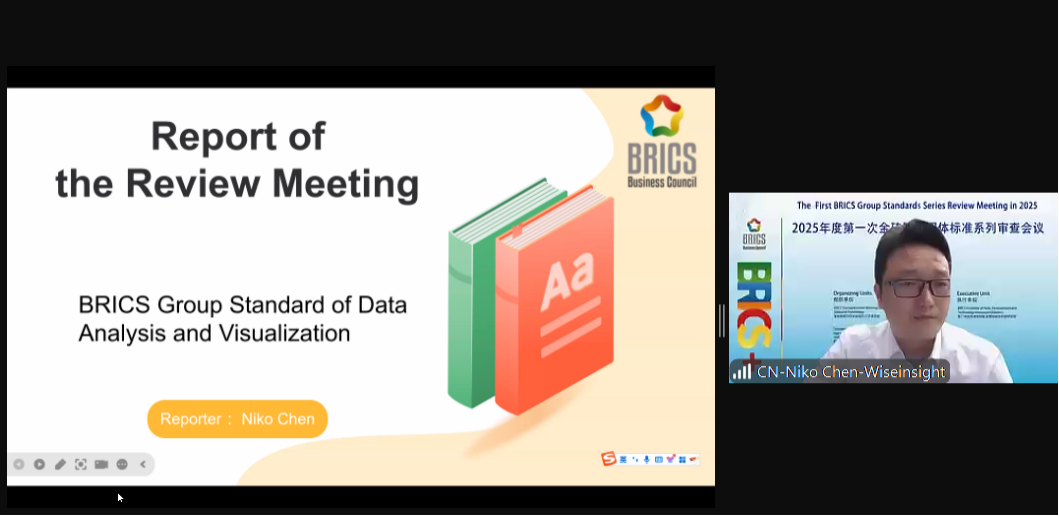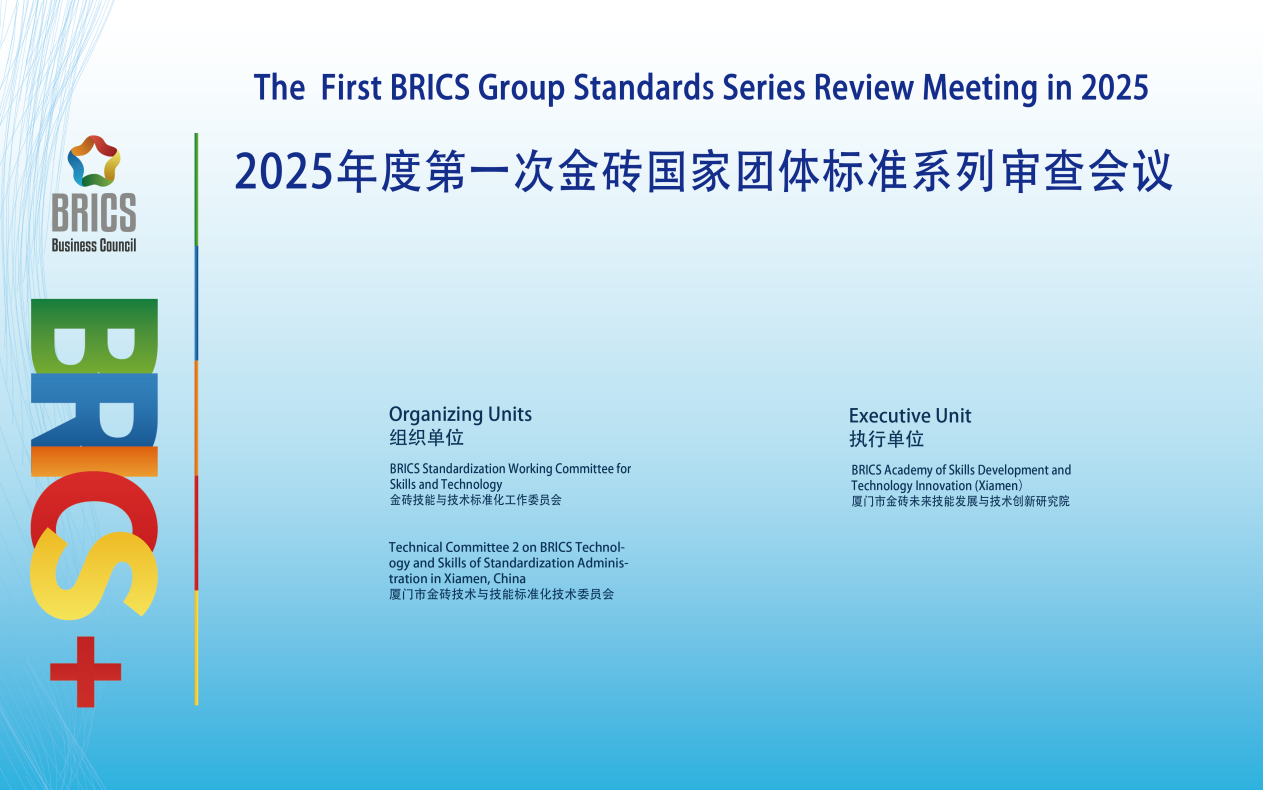The First BRICS Group Standards Review Meeting of 2025 Successfully Convened
- Date:
2025/6/13 13:52:35 - Author:BRICS Standardization Working Committee for Skills and Technology
- Visits: 3914
On June 3, 2025, the first BRICS Group Standards Review Meeting of the year was successfully held. The event was co-hosted by BRICS Standardization Working Committee for Skills and Technology(referred to as "BRICS Standardization Committee") and Technical Committee 2 on BRICS Technology and Skills of Standardization Administration in Xiamen,China and organized by BRICS Academy of Skills Development and Technology Innovation(Xiamen).
Conducted in an online format, the meeting brought together 15 expert representatives from China, Brazil, Russia, South Africa, Iran and Indonesia. The participants engaged in in-depth discussions and reviews of the draft BRICS group standards covering "Building Information Modeling," "Drone Operation," and "Data Analysis and Visualization"—including skills, curriculum and competition.
Dr. Liu Zhenying, Chairman of China Chapter of BRICS Business Council Skills Development, Applied Technology and Innovation Working Group, Chairman of BRICS Standardization Working Committee for Skills and Technology and President of BRICS Academy of Skills Development and Technology Innovation (Xiamen), delivered opening remarks.
Mr. Valério Junior Piana, Internationalization Coordinator of SENAI Institutes of Innovation and Technology in Brazil and a member of BRICS Standardization Committee; Professor Klimova Galina from Moscow State Tsaritsyno College; Associate Professor Jacob Jacobus Greeff from the Institute of Computer Science and Information Systems at North-West University, South Africa and a member of BRICS Standardization Committee; and Ms. Tri Mumpuni, Director at the National Research and Innovation Agency of the Republic of Indonesia (BRIN) and Board Member of the Indonesian Business and Economy Democracy Foundation (IBEKA), all of whom addressed the meeting as expert reviewers.
In addition, approximately 120 experts from drafting organizations attended the review session as observers.




Dr. He Yiwei, expert representative of the drafting working group for the BRICS Group Standard on the "Building Information Modeling (BIM)" skills from Guangzhou City Polytechnic, introduced the background, structural framework, and feedback process of the BIM skills standard. She emphasized that the standard contributes to unifying industry skill benchmarks and enhancing practitioners’ competencies.
Ms. Kuang Shiyao, expert representative of the drafting working group for the BRICS Group Standard on the "Building Information Modeling (BIM)" competition from Jilin Jianzhu University, presented the development of the BIM competition standard. She provided a detailed explanation of its design regarding competition rules, scoring system, and technical environment. Ms. Kuang highlighted that the standard integrates international best practices with the realities of BRICS countries, ensuring fairness and impartiality in competitions.


Mr. Yu Laibao, expert representative of the drafting working group for the BRICS Group Standard on the "Industrial Design Technology" skills from Wuhan City Polytechnic, presented the drone operation skills standard. He emphasized that the standard helps to regulate operators' skill levels, thereby ensuring safe and efficient execution of tasks.
Ms. Fu Yilei, expert representative of the drafting working group for the BRICS Group Standard on the "Industrial Design Technology" curriculum from Tianjin Modern Vocational Technology College, reported on the curriculum standard. She noted that the standard aligns with industry development and emphasizes a balance between theoretical knowledge and practical training.
Ms. Yu Siqi, expert representative of the drafting working group for the BRICS Group Standard on the "Industrial Design Technology" competition from Shenzhen Institute of Information Technology, introduced the competition standard. She pointed out that the standard contributes to creating a fair and transparent competition environment, and promotes the exchange and application of drone technologies.



Mr. Chen Ji, President of Chongqing Hanhai Ruizhi Big Data Technology Co., Ltd. and expert representative of the drafting working group for the BRICS Group Standard on the “Data Analysis and Visualization,” delivered a report on behalf of the team. He outlined the content and development process of the skills, curriculum, and competition standards, emphasizing that the standards cover a range of competencies from basic to advanced levels. These standards are aligned with industry needs and draw on international best practices, providing strong support for education, training, and competition organization.
Mr. Chen highlighted the significant application value of data analysis and visualization technologies in the digital era. He noted that the formulation of these standards aims to cultivate professional talent and promote the widespread application of such technologies.

Professor Klimova Galina from Russia emphasized the significance of developing the BIM standard in advancing the digital transformation of the construction industry. She also offered valuable feedback on specific aspects of the standard, such as further refining the classification of skill levels and detailing the scoring criteria.
Following the presentations by expert representatives of each drafting working group and a review of the submitted draft standards, the panel of reviewers engaged in thorough discussions. The standards under review were unanimously approved in their submitted draft form during the meeting.




Dr. Liu Zhenying stated that the core work for the three standard projects—Building Information Modeling, Drone Operation, and Data Analysis & Visualization—has been successfully completed. Led by the BRICS Business Council and advanced under the framework of BRICS Standardization Committee, these projects mark a key milestone after three years of development since the initiative began in 2021.
Dr. Liu noted that the BRICS Group Standards platform has now been established, providing accessible services for inquiry and application of standards across BRICS countries. He also announced the official launch of the “Skills Passport” project, which will focus on key areas such as artificial intelligence, digital technologies, and intelligent manufacturing. Efforts will be made to accelerate the development of new standards and promote standard integration and international alignment.
Dr. Liu emphasized that standardization is not only a process of technical specification, but also a vital pathway for transforming technological innovations into intellectual property assets. Through the formulation and widespread adoption of standards, technological achievements can be effectively consolidated, and the originality of innovations can be better identified and protected—laying a solid foundation for academic publication, project investment, and market cooperation.
He further highlighted that advancing standardization efforts contributes to building a systematic intellectual property asset framework, thereby enhancing a country's strategic position in global technological competition. This is not merely a market-driven initiative, but a strategic arrangement of intellectual assets at the national level.

The successful convening of this meeting has injected new momentum into BRICS cooperation in the development of group standards. It has further advanced the formulation and refinement of skills, curriculum, and competition standards for BRICS competitions in Building Information Modeling, Drone Operation, and Data Analysis & Visualization. These efforts provide a scientific foundation and strong support for talent cultivation, curriculum development, and competition organization in related fields.
This year, the BRICS Standardization Committee will continue to promote standard development in additional areas, including business digital capabilities, additive manufacturing, responsive care for infants, artificial intelligence, and edge computing—contributing to the shared progress of BRICS countries in science, education, and economic development.
Participants expressed their anticipation of continued involvement in such high-level academic exchange and collaborative activities in the future.


 闽公网安备 355885854552266号
闽公网安备 355885854552266号